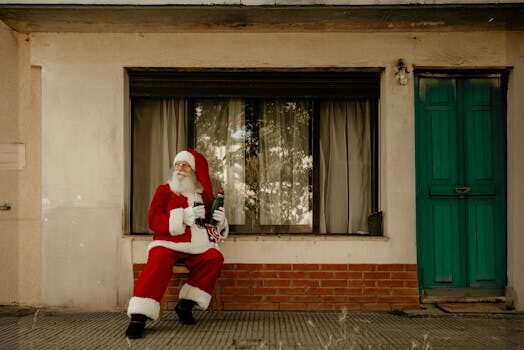Stop believing in Santa? What age do kids usually stop?

The belief in Santa Claus is a magical experience for many children, igniting excitement and wonder during the holiday season. However, there comes a time when this belief starts to wane. Understanding what age children typically stop believing in Santa can help parents navigate this transition with sensitivity.
Research suggests that this pivotal moment varies widely among children, and it is influenced by several factors, including social interactions and regional traditions. In this article, we will explore various facets of this topic to provide insights for parents and caregivers.
How old do children typically stop believing in Santa?
On average, children in the United States stop believing in Santa Claus around 8.4 years old. However, this age is not uniform across the country. For instance, children in Mississippi tend to hold onto their belief a bit longer, stopping around 10.2 years, while those in Oregon may let go of the magic as early as 7.4 years.
Factors such as family traditions, peer influence, and individual personality traits can affect when children come to doubt Santa's existence. Some children might cling to their belief longer due to a strong emotional attachment, while others might be quick to question it after hearing differing views from friends.
Additionally, as children reach the age of reason, they often start to apply logic to their belief systems, prompting them to question the plausibility of Santa's feats. This transition varies greatly, with some children actively engaging in discussions about Santa's reality.

At what age do kids usually stop believing in Santa Claus?
The age at which children stop believing in Santa Claus can be influenced by various elements. While the average age is around 8.4, it's essential to recognize that each child is different. Some children might continue to believe until they are 10 or 11, depending on their experiences and surroundings.
Many children begin to experience doubt around age 6 or 7, often sparked by conversations with peers or observations of holiday practices. The pressure to fit in and align with their friends' beliefs can lead to confusion, making it a critical period for parents to address the topic.
Being aware of the signs that your child is questioning Santa can be helpful. If they start asking pointed questions or showing skepticism, it may be a good time for a conversation about belief, magic, and the spirit of Christmas. Such discussions can foster understanding and acceptance.
When do most children begin to question Santa Claus?
Most children start to question Santa Claus between the ages of 5 and 7. This questioning phase is a natural part of cognitive development and reflects their growing ability to think critically.
During this time, children may encounter inconsistencies in the Santa narrative, such as how Santa can deliver gifts to millions of homes in one night or how he is able to fit down chimneys. These questions often arise from comparing notes with friends and noticing differences in beliefs.

Moreover, as they grow older, children become more aware of the logistics and challenges surrounding Santa's story. This newfound curiosity can lead to a mix of excitement and confusion, making open discussions between parents and children essential.
What are the regional variations in believing in Santa?
- In the southeastern United States, children tend to hold onto their belief longer, often stopping around 10.2 years.
- Conversely, in the Pacific Northwest, children may stop believing as early as 7.4 years.
- Cultural practices and family traditions also play a significant role in these regional differences.
- For example, areas with vibrant Santa traditions might see children maintaining belief longer due to repeated exposure to the lore.
Understanding these regional variations can provide context for parents. For some families, keeping the magic alive may mean adopting certain traditions or being more proactive in discussing Santa.
Is there an appropriate age to reveal the truth about Santa?
Determining the right age to reveal the truth about Santa Claus can be a delicate matter. While some parents choose to tell their children the truth as soon as they start questioning, others may wait until the child explicitly asks.
There is no universally correct age, but many experts suggest that around age 8 is generally a good guideline. At this age, children are usually better equipped to handle the emotional complexities of the conversation and can appreciate the spirit of giving that Santa represents.
It's essential for parents to approach this conversation with care, emphasizing the positive aspects of belief in Santa and the joy of the holiday season. Leaving room for imagination while also providing honest answers can help ease the transition.

How do children react upon learning the truth about Santa?
Children's reactions to learning the truth about Santa can vary widely. Some may feel a sense of relief, especially if they've been grappling with doubts. Others might experience feelings of disappointment or sadness, particularly if they felt a strong connection to the magic of Santa.
It's crucial for parents to validate their children's feelings during this transition. Engaging in a compassionate dialogue can help children process their emotions and understand that the joy of Christmas is not solely tied to Santa.
In many cases, children may embrace the opportunity to become part of the tradition in a new way, perhaps by helping to play Santa for younger siblings or relatives. This shift can foster a sense of belonging and continuity in holiday celebrations.
Questions related about the age of believing in Santa
What is the average age to stop believing in Santa?
The average age for children to stop believing in Santa is about 8.4 years. However, this can vary significantly based on individual circumstances and cultural contexts. Factors such as family traditions, peer discussions, and individual temperament influence when a child might let go of this belief.
Is it normal for a 12 year old to believe in Santa?
While it is less common for a 12-year-old to believe in Santa, it is not unheard of. Some children may hold onto the belief longer due to family traditions or a personal connection to the magic of Santa. It's important for parents to navigate this situation with sensitivity and understanding, acknowledging their child's feelings.

Is 10 too old to believe in Santa?
Believing in Santa at the age of 10 is generally considered on the older side, but it is not unusual. The appropriateness of this belief depends on the child's experiences and the family environment. Parents can use this time to discuss the spirit of giving and the joy of Christmas beyond the Santa narrative.
What age does Santa stop coming?
Santa typically "stops coming" when children lose their belief, which, on average, occurs around 8.4 years old. However, many families continue celebrating Santa traditions well into the teenage years, emphasizing the spirit of giving rather than the specific belief in Santa. It’s not about whether or not Santa comes but how the family celebrates together.